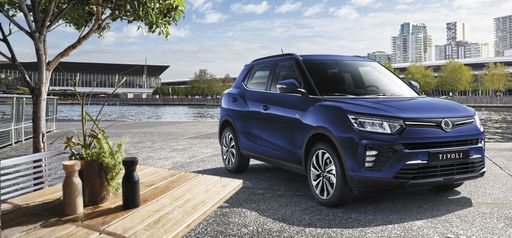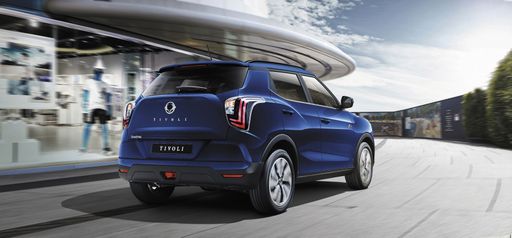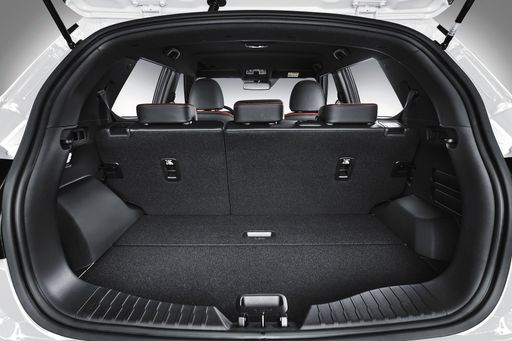Nissan Interstar VS SsangYong Tivoli – Specs, Efficiency & Price Comparison
Which model is the better choice – the Nissan Interstar or the SsangYong Tivoli? We compare performance (170 HP vs 163 HP), boot capacity ( vs 720 L), efficiency (7.40 L vs 7 L), and of course, the price (34900 £ vs 21400 £).
Find out now which car fits your needs better!
The Nissan Interstar (Cargo Van) is powered by a Diesel or Electric engine and comes with a Manuel or Automatic transmission. In comparison, the SsangYong Tivoli (SUV) features a Petrol engine and a Manuel or Automatic gearbox.
When it comes to boot capacity, the Nissan Interstar offers , while the SsangYong Tivoli provides 720 L – depending on what matters most to you. If you’re looking for more power, you’ll need to decide whether the 170 HP of the Nissan Interstar or the 163 HP of the SsangYong Tivoli suits your needs better.
There are also differences in efficiency: 7.40 L vs 7 L. In terms of price, the Nissan Interstar starts at 34900 £, while the SsangYong Tivoli is available from 21400 £.
Compare all the key specs now and find out which model fits your lifestyle best!
Nissan Interstar
The Nissan Interstar is a versatile van that expertly combines practicality with modern design. It offers a spacious interior that caters to both cargo and passenger needs, making it ideal for businesses and families alike. With its robust performance and efficient fuel consumption, the Interstar stands out as a reliable choice in the commercial vehicle market.
detailsSsangYong Tivoli
The SsangYong Tivoli is a compact SUV that seamlessly blends style with practicality, making it an appealing choice for urban drivers. Its sleek design is complemented by a well-crafted interior, offering a comfortable and spacious experience for passengers. With its reliable performance and modern features, the Tivoli stands out as a versatile option in the competitive compact SUV market.
details @ Ssangyong
@ Ssangyong
 @ Ssangyong
@ Ssangyong
 @ Ssangyong
@ Ssangyong

|
|
|
|
|
Costs and Consumption |
|
|---|---|
|
Price
34900 - 55600 £
|
Price
21400 - 30300 £
|
|
Consumption L/100km
7.4 - 7.5 L
|
Consumption L/100km
7 - 8.3 L
|
|
Consumption kWh/100km
-
|
Consumption kWh/100km
-
|
|
Electric Range
175 - 410 km
|
Electric Range
-
|
|
Battery Capacity
-
|
Battery Capacity
-
|
|
co2
0 - 195 g/km
|
co2
161 - 191 g/km
|
|
Fuel tank capacity
80 L
|
Fuel tank capacity
50 L
|
Dimensions and Body |
|
|---|---|
|
Body Type
Cargo Van
|
Body Type
SUV
|
|
Seats
3 - 7
|
Seats
5
|
|
Doors
4
|
Doors
5
|
|
Curb weight
2053 - 2535 kg
|
Curb weight
1375 - 1492 kg
|
|
Trunk capacity
-
|
Trunk capacity
395 - 720 L
|
|
Length
5680 - 6315 mm
|
Length
4225 - 4480 mm
|
|
Width
2080 mm
|
Width
1810 mm
|
|
Height
2498 - 2756 mm
|
Height
1613 - 1646 mm
|
|
Payload
965 - 1447 kg
|
Payload
425 - 455 kg
|
Engine and Performance |
|
|---|---|
|
Engine Type
Diesel, Electric
|
Engine Type
Petrol
|
|
Transmission
Manuel, Automatic
|
Transmission
Manuel, Automatic
|
|
Transmission Detail
Schaltgetriebe, Automatikgetriebe
|
Transmission Detail
Manual Gearbox, Automatic Gearbox
|
|
Drive Type
Front-Wheel Drive
|
Drive Type
Front-Wheel Drive, All-Wheel Drive
|
|
Power HP
105 - 170 HP
|
Power HP
163 HP
|
|
Acceleration 0-100km/h
-
|
Acceleration 0-100km/h
-
|
|
Max Speed
115 - 177 km/h
|
Max Speed
175 - 181 km/h
|
|
Torque
300 - 380 Nm
|
Torque
260 - 280 Nm
|
|
Number of Cylinders
4
|
Number of Cylinders
4
|
|
Power kW
77 - 125 kW
|
Power kW
120 kW
|
|
Engine capacity
1997 cm3
|
Engine capacity
1497 cm3
|
General |
|
|---|---|
|
Model Year
2024 - 2025
|
Model Year
2021 - 2024
|
|
CO2 Efficiency Class
G, A
|
CO2 Efficiency Class
F, G
|
|
Brand
Nissan
|
Brand
SsangYong
|
Nissan Interstar
The Evolution of the Nissan Interstar
The Nissan Interstar has long been a staple in the commercial vehicle sector, known for its robust build and practical design. The latest iterations have further cemented its status with a range of technical enhancements and innovative features aimed at aiding businesses in achieving optimal efficiency. Whether you're navigating city streets or traversing the highways, the Interstar stands out as a reliable workhorse ready to meet various transport needs.
Power and Performance
The current range of Nissan Interstar models boasts diesel engines ranging from 105 to 180 PS, offering a commendable blend of power and fuel efficiency across the board. With a fuel consumption of between 7.4 and 7.5 litres per 100 kilometres, these vehicles are designed to minimise operational costs while maximizing performance.
All models feature four-cylinder engines, with engine displacement between 1997 and 2299 cm³, capable of producing torque figures between 330 and 400 Nm. These specifications ensure that the Interstar offers superior pulling power, which is particularly useful for transporting heavy loads across different terrains.
Transmission and Drive Options
Versatility is at the heart of the Nissan Interstar, with transmission options including both manual and automatic gearboxes. Drivers can also choose between front-wheel and rear-wheel drive configurations, allowing the vehicle to suit specific logistical requirements or personal preferences.
For those seeking simplicity and ease of use in urban environments, the Interstar with its automated gearshift provides a smooth driving experience, reducing driver fatigue and increasing focus on the road ahead.
Dimensions and Load Capacities
The Nissan Interstar is available in various lengths, from 5048 mm to an extensive 6848 mm, catering to diverse commercial needs. With widths ranging from 2070 mm to 2222 mm and heights from 2307 mm to 2808 mm, the Interstar offers multiple configurations to maximise cargo space and accommodate various loads.
With a maximum payload capacity of up to 1451 kg, businesses can rest assured that the Interstar is more than capable of delivering goods efficiently without compromising on safety or comfort.
Innovation and Technological Features
While functionality remains a priority, Nissan has not skimped on technological advancements. Among the innovations included are advanced safety features, such as anti-lock braking systems (ABS), electronic stability control (ESC), and a variety of sensors to assist with parking and reversing.
In terms of driver comfort, the brand offers multiple trim levels with exceptional interior features designed to enhance driver experience during long hauls. Options such as climate control, advanced navigation systems, and modern infotainment setups are available, ensuring that both driver and passenger remain comfortable and connected, regardless of the journey length.
Coachwork and Trim Options
The Interstar line-up provides a range of trim levels and equipment lines, from the entry-level Visia to the high-spec Tekna, catering to different market demands and individual preferences. The selection allows buyers to prioritise features that best suit their operation or driving style.
For example, the N-CONNECTA variant offers an array of added extras, enhancing both connectivity and comfort for drivers who rely on the vehicle as a mobile office.
Conclusion
The Nissan Interstar represents a harmonious blend of power, efficiency, and technological innovation in the large van segment. With its vast array of options and features, the Interstar is undeniably a top choice for businesses looking to invest in a dependable and adaptable commercial vehicle. As the line-up continues to evolve, the Interstar remains poised to meet the growing challenges and demands of the modern logistic landscape.
SsangYong Tivoli
Discover the SsangYong Tivoli: A Blend of Comfort and Performance
In the realm of compact SUVs, the SsangYong Tivoli has carved out a niche for itself with its blend of robust performance and luxurious comfort. Catering to a diverse range of drivers, the Tivoli stands as a testament to SsangYong's commitment to innovation, efficiency, and style. This article dives into the technical brilliance and innovations that make the Tivoli a standout choice in its segment.
Performance Unleashed: Under the Bonnet of the Tivoli
The SsangYong Tivoli does not shy away from showcasing its engineering prowess. With a powerful 1.5 GDI-T petrol engine under its bonnet, the Tivoli offers a thrilling 163 PS (120 kW), ensuring a spirited drive. This engine is paired with either a manual or automatic transmission, providing drivers with options to match their driving preferences.
The Tivoli's performance metrics are equally impressive, boasting a torque range between 260 and 280 Nm. These figures translate to a responsive and dynamic driving experience, whether you're navigating city streets or cruising on highways. Top speeds range from 175 to 181 km/h, underscoring the Tivoli's versatility as a daily driver with an adventurous side.
Efficient on the Roads: Fuel Economy and CO2 Emissions
Efficiency is a hallmark of the Tivoli, with fuel consumption figures ranging between 7 and 8.3 L/100km, depending on the chosen configuration. It's not just about performance; the Tivoli strikes a balance by ensuring environmental considerations are met, with CO2 emissions between 161 and 191 g/km, placing it in the CO2 efficiency classes of F and G.
Innovative and Spacious Design
Designed with the modern driver in mind, the Tivoli combines functionality with style. Its exterior dimensions—spanning a length of 4225 to 4480 mm—create a commanding presence on the road, while its height of 1613 to 1646 mm and width of 1810 mm suggest ample interior space. With a boot space offering 395 to 720 litres, the Tivoli caters to both urban living and adventurous getaways.
Comfort Meets Technology: Inside the Tivoli
The interior of the Tivoli is a reflection of SsangYong's dedication to comfort and technology. Accommodating up to five passengers, the Tivoli ensures every ride is a comfortable journey with advanced features and materials. The availability of various trim levels, such as the Amber, Blackline, and Quartz, allows for personalisation, meeting the specific needs and desires of each driver.
The Tivoli's Commitment to Safety
Safety remains a priority for SsangYong, and the Tivoli is no exception. Equipped with a range of safety features, including a reinforced body structure, multiple airbags, and advanced driver assistance systems, the Tivoli ensures peace of mind for all occupants.
Conclusion
The SsangYong Tivoli is more than just a compact SUV; it is a symbol of outstanding engineering fused with everyday practicality. Whether it's the daily commute or a weekend getaway, the Tivoli is equipped to handle a variety of driving scenarios with style and efficiency. For those seeking a vehicle that combines reliability with cutting-edge technology, the Tivoli stands as a noteworthy contender in the SUV market.
The prices and data displayed are estimates based on German list prices and may vary by country. This information is not legally binding.
